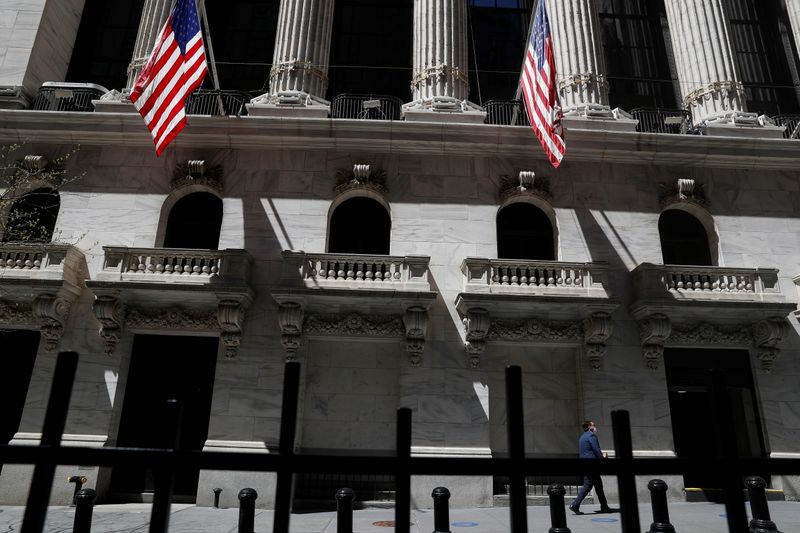By Shreyashi Sanyal and Krystal Hu
(Reuters) - The S&P 500 and the Dow indexes rose on Monday amid a largely upbeat earnings season, while the Nasdaq came under pressure from declines in some high-flying growth stocks, as the rotation into cyclical and "reopening" stocks continued.
Economy-sensitive cyclical S&P 500 sectors such as consumer staples, energy, industrials and materials outperformed sectors housing growth stocks, including technology and communication services, by early afternoon.
By 2:15 p.m. ET (1815 GMT), the Dow Jones Industrial Average rose 282.76 points, or 0.83%, to 34,157.61, the S&P 500 gained 18.49 points, or 0.44%, to 4,199.66 and the Nasdaq Composite dropped 40.13 points, or 0.29%, to 13,922.55.
"We've seen a slight change in the pace of value stocks outperforming growth stocks year-to-date," said Rod von Lipsey, managing director at UBS Private Wealth Management. "We still continue to believe that value will be a source of outperformance during increased mobility and recovery."
The Nasdaq index fell as megacap technology stocks, including Amazon.com Inc (NASDAQ:AMZN), Alphabet (NASDAQ:GOOGL) Inc, Facebook Inc (NASDAQ:FB) and Microsoft Corp (NASDAQ:MSFT), traded lower despite largely upbeat results.
The stocks have struggled to maintain the upward trajectory coming into reporting season. Chipmakers also fell, with the Philadelphia SE Semiconductor index down 1.5%.
With more than half of S&P 500 companies having reported so far, profits are now seen rising 46% in the first quarter, compared with forecasts of 24% growth at the start of April, according to IBES data from Refinitiv. About 87% of the companies have come also reported earnings per share ahead of analysts' estimates.
"This is now the fourth straight quarter of earnings just absolutely crushing estimates," said Ross Mayfield, investment strategy analyst at Baird. "I think there just continues to be an underestimation of how strong this rally and how strong the economy is rebounding."
Strong earnings, improving economic data, fiscal stimulus and the Federal Reserve's ultra accommodative stance have supported markets, pushing the S&P 500 and the Nasdaq indexes to record levels last week.
Data on Monday showed U.S. manufacturing activity grew at a slower pace in April, likely constrained by shortages of inputs amid pent-up demand due to rising vaccinations and massive fiscal stimulus.
The Labor Department's non-farm payrolls data, slated to be released on Friday, is expected to show a rise in job additions in April.
The largest percentage gainer on the S&P 500 was Gap Inc (NYSE:GPS), which rose 9.1%, while the largest decliner was Estee Lauder (NYSE:EL), down 6.9% after the cosmetics maker missed analysts' estimates for third-quarter sales.
On the Nasdaq 100 the largest gainer was Moderna (NASDAQ:MRNA) Inc, which rose 4.3% after the drugmaker said it will supply 34 million doses of its COVID-19 vaccine this year to the global COVAX program.
Tesla (NASDAQ:TSLA) Inc fell 3.6%. Industry sources told Reuters the electric-vehicle maker, under scrutiny in China over safety and customer service complaints, is boosting its engagement with mainland regulators and beefing up its government relations team.
The S&P index recorded 82 new 52-week highs and no new low, while the Nasdaq recorded 104 new highs and 39 new lows.
Is MSFT truely undervalued?
With MSFT making headlines, investors are asking: Is it truly valued fairly? InvestingPro's advanced AI algorithms have analyzed MSFT alongside thousands of other stocks to uncover hidden gems with massive upside. And guess what? MSFT wasn't at the top of the list.
Unlock ProPicks AI


